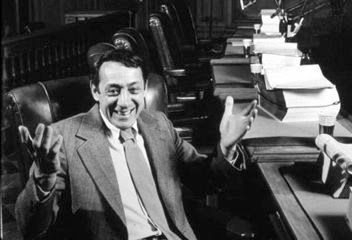By Christie Keith, Special to 365gay.com
This Thanksgiving Day, at 10:55 a.m. Pacific Standard Time, it was 30 years since a bullet exploded in Harvey Milk’s brain, killing him.
It was fired from the gun of Dan White, an ex-cop who’d gone to Milk’s City Hall office after killing San Francisco Mayor George Moscone, who had refused to re-appoint White to the Board of Supervisors from which he’d recently resigned. Harvey Milk was San Francisco’s first openly gay supervisor, swept into power in the same neighborhood revolution that gave White his victory in 1978. It was Milk’s fourth run for office, and the first successful one, although he was the recognized leader of San Francisco’s large and growing gay population.
Harvey Milk was San Francisco’s first openly gay supervisor, swept into power in the same neighborhood revolution that gave White his victory in 1978. It was Milk’s fourth run for office, and the first successful one, although he was the recognized leader of San Francisco’s large and growing gay population.
Milk was a newcomer to politics. He’d blown into town when he was in his 40s and disrupted the existing gay power structure with his in-your-face grassroots activism and refusal to cower and apologize for being gay.
His watchword was “Come out, come out, wherever you are,” and he used tactics those who recently watched Barack Obama’s campaign would easily recognize: register voters, get out the vote, organize relentlessly, empower your volunteers and supporters, and spread a message of hope. He became an acknowledged power broker, and many observers believed he was on track to being the nation’s first openly gay mayor.
But just as it was violence and police brutality at New York City’s Stonewall Inn a decade before that had given birth to the modern gay rights movement, it was violence and police brutality that marked the end of its first wave. Dan White was convicted of nothing more than second degree manslaughter for the killing of Milk and Moscone. (White later gave himself a harsher sentence, and took his own life after being released from prison.)
The gay community came together in fierce sorrow after Milk was killed, with a miles-long peaceful candlelight vigil stretching from the Castro district to City Hall.
But it erupted in rage at White’s sentence, burning a dozen police cars and the basement of City Hall in what became known as the “White Night Riot.” The police retaliated the next night, hiding their badges while beating patrons during a raid of the Elephant Walk, an upscale gay bar in the Castro.
Lesbian activist Sally Gearhart told the crowd protesting White’s sentence that “Harvey Milk lives!” A demonstrator shouted back, “No, he’s dead, you fool!” And it was true. It was also true that in the months and even years after those violent events, the neighborhood-centered, grassroots politics Milk practiced vanished with him from both the city and national stages. No other leader emerged from the gay community to take his place. His legacy, like the man, appeared dead.
But was it?
At Milk’s memorial service, his successor on the Board of Supervisors, Harry Britt, told the crowd, “Something very special is going to happen in this city, and it will have Harvey Milk’s name on it…. Harvey will be in the middle of us, always, always.” It was hard to see in the aftermath of his death, but it turns out Britt was right.
When AIDS struck in the 80s, a group of street activists who later became known as ACT-UP began to organize, protest, and disrupt the institutions of commerce and government, demanding a better response to the epidemic that was killing so many in our community. Their slogan was “Silence=death,” and it’s one that Harvey, famous for both hyperbole and verbosity, would have loved.
Milk political protégé Cleve Jones went on to found the Names Project AIDS Memorial Quilt, one of the single most successful acts of political theater and personal mourning ever conceived. It has traveled around the nation and the globe, was the subject of an Academy Award winning documentary, and is still the largest piece of community folk art in the world. It was catharsis for us as we lost countless friends and loved ones, and incited powerful sympathy and connection in people not of our community who grieved – and stood – with us.
Harvey Milk’s life has been the subject of a best-selling book, an Academy Award winning documentary, and an opera. His name graces schools, civic projects, and gay democratic clubs across the country. And at the very moment some feared his story was slipping off the stage of history, gay director Gus Van Sant and gay screenwriter Dustin Lance Black unleashed “Milk,” in which a transcendent Sean Penn brings Harvey and his struggle ...
--more--
*365Gay.com

No comments:
Post a Comment